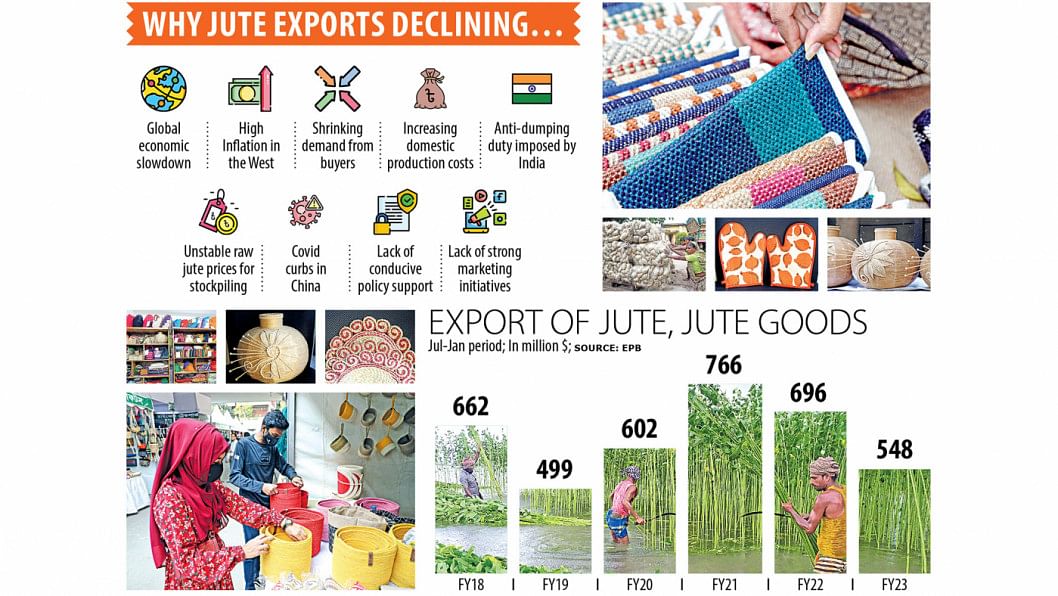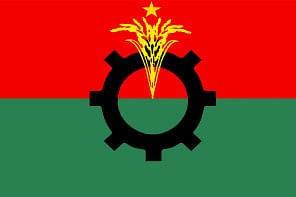No respite from jute export slump

Earnings from jute exports from Bangladesh slumped for the second consecutive year in July-January, raising concerns for the promising industry, one of the few sectors for which raw materials are locally available.
Due to the global economic slowdown, shrinking demand, increasing domestic production cost and the persisting anti-dumping duty imposed by India played a part in dragging exports down, industry insiders and economists say.
The country's jute industry fetched $548 million by selling jute and jute-made products in the first seven months of the current financial year of 2022-23, down 21.22 per cent year-on-year, data from the Export Promotion Bureau showed.
In the same period of 2021-22, the export receipts stood at $696 million, also a decrease of 9 per cent from a year prior.
"Jute exporters are struggling to sustain in the global market even after cutting prices, owing to the shrinking global demand," said Mohammed Mahbubur Rahman Patwari, a former chairman of the Bangladesh Jute Spinners Association (BJSA).
Bangladesh exports raw jute, jute yarn and twine, sacks and bags, and jute-made products.
Local industries mainly export jute yarns to Turkey, China and India.
The jute yarn export suffered because of a dip in demand among carpet makers, the main user of the item, said Helal Ahmed, chief operating officer of Janata Jute Mills and Sadat Jute Industries Ltd.
Bangladesh usually exported 220,000 tonnes of yarn to Turkey, the key market. But the shipment to the country declined by nearly 100,000 tonnes as carpet makers have cut production in the face of falling demand for the products because of the war in Ukraine and the slowdown in the global economy.
A section of carpet makers has shifted to using alternative yarn owing to the higher prices of jute yarn, said Ahmed.
Orders from China have decreased due to the coronavirus-related lockdowns as Chinese companies could not run their export activities properly after importing yarn from Bangladesh.
Both Patwari, also the managing director of Sonali Aansh Industries Limited, and Md Abul Hossain, chairman of the Bangladesh Jute Mills Association, blamed the policy of persisting anti-dumping duty issued by the Indian government for the low export performance.
"The anti-dumping duty is a major problem for local jute exporters," said Hossain.
In December, India extended the anti-dumping duty on jute products imported from Bangladesh by five years.
Hossain also blamed the effects of the coronavirus pandemic and the ongoing Russia-Ukraine War.
"We were exporting to Russia and Ukraine, but these markets are not accessible now," he said.
Jute millers cited the country's high production cost stemming from high energy prices, driven by the spike in both gas and electricity tariffs.
As a result, a number of jute textile millers have been either forced to shut down their factories or operate below their capacity, they said.
"I have been forced to cut production by half to avoid incurring losses," said Md Saiful Islam, managing director of Mazeda Jute Industries.
The production of jute textiles was 2.43 lakh tonnes in 2021-22, down by 28 per cent a year ago, according to the Bangladesh Bureau of Statistics.
Janata and Sadat Jute's Ahmed said their companies have not cut production significantly but many jute mills had to reduce output in the wake of falling demand in the export markets.
Janata-Sadat is one of the largest jute yarn and jute goods producers in Bangladesh with 110,000 tonnes in annual production capacity.
Islam, also a director of the BSJA, said millers like him face a 2 per cent source tax, which worked against their competitiveness in the global market since costs have gone up.
"The jute industry needs to be saved by withdrawing or suspending this tax and by unveiling other conducive policy support."
Pakistan, Nepal and India are the major importing countries of Bangladeshi raw jute, but these nations have cancelled orders, saying they can't afford to open letters of credit, said Arzu Rahman Bhuiyan, senior vice-chairman of the Bangladesh Jute Association.
Bangladeshi exporters are facing challenging times but the current situation has not emerged from nowhere, according to Esrat Jahan Chowdhury, a director of the Bangladesh Jute Goods Exporter's Association.
"At the onset of the pandemic three years ago, exporters had to pay extra for raw materials. Then there was the high freight cost. At that time, some buyers turned to alternative packaging items."
"Besides, our competitors are steadily capturing the global market due to a lack of strong marketing initiatives on the part of Bangladesh."
Khondaker Golam Moazzem, research director of the Centre for Policy Dialogue, terms the negative trends of the jute export sector as a threat to the industry as well as the economy.
The economist blamed India's anti-dumping policy, the stance of the government of Bangladesh and the persisting dollar domination in the global market for the current situation.
"The anti-dumping policy is a major barrier for us as India is a big market for Bangladeshi jute. The government should try to negotiate the issue as soon as possible."
He urged the government to promote the golden fibre by implementing supportive policies.
Ahmed expects the demand from export markets to remain sluggish in the first half of 2023.
"It may recover in the second half."


 For all latest news, follow The Daily Star's Google News channel.
For all latest news, follow The Daily Star's Google News channel. 








Comments